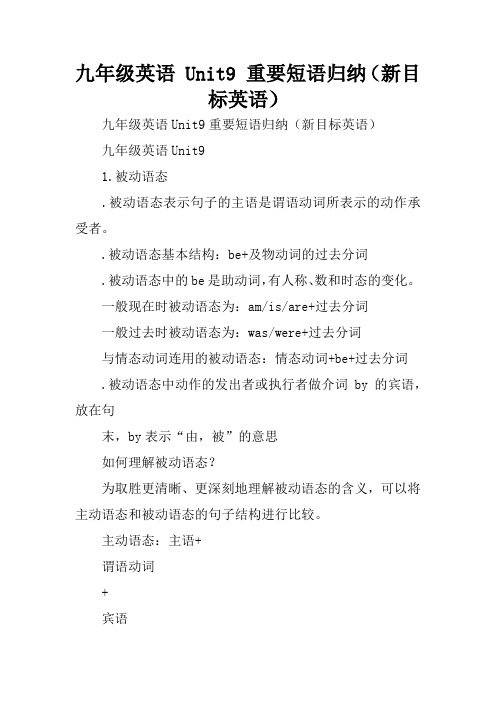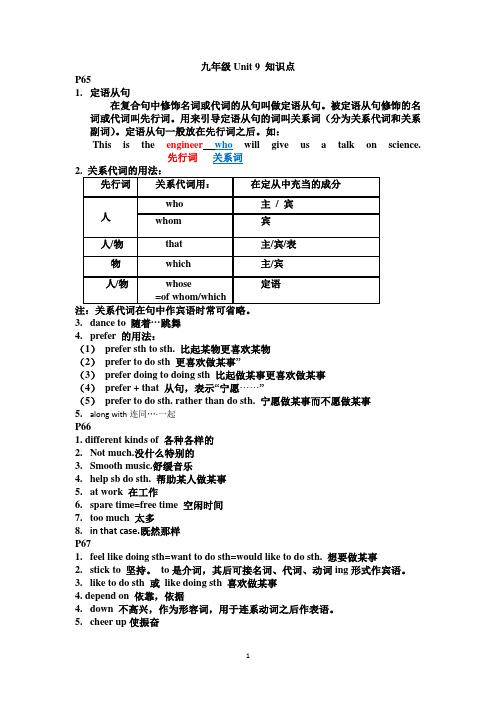北师大版九年级英语全册unit9知识点 语法点(含答案)
- 格式:docx
- 大小:69.13 KB
- 文档页数:17

九年级英语unit9知识点语法九年级英语Unit 9 知识点语法九年级英语Unit 9是一个非常重要的单元,涵盖了很多语法知识点。
在本文中,我们将以不同的角度来探讨这些知识点,并结合例句来帮助学生更好地理解和掌握。
1. 过去进行时过去进行时描述过去某个时间或状态的持续性动作。
它的构成是:was/were + 动词的ing形式。
例如:- I was studying when she called me.- They were playing soccer in the park yesterday.2. 被动语态被动语态用于强调动作的接受者,而不是执行者。
它的构成是:be动词(am/is/are/was/were)+ 过去分词。
例如:- The book was written by J.K. Rowling.- The cake was eaten by the children.3. 倒装句倒装句常用于强调句子中的某一部分或者在特殊情况下使用。
主要有以下三种情况:- 定位副词位于句首时,主语和谓语动词颠倒。
- 含有“否定词+never”的句子,当表达完全不可能的情况时,需要把助动词或情态动词提前,即“否定词/never+助动词/情态动词+主语+谓语”。
- 在so/such的引导下的倒装句,主要是用于表示由前一句引起的结果。
例如:- Upstairs sat the old man, reading a book.- Never have I seen such a beautiful sunset.- So loud was the music that I couldn't sleep.4. 特殊疑问句特殊疑问句用于询问特定的信息。
在一般疑问句的基础上,改变谓语动词的位置,并使用特殊疑问词。
例如:- What did you do last weekend?- Where is your brother going on vacation?- How long have you been studying English?5. 非限制性定语从句非限制性定语从句用于对先行词进行补充说明,一般用逗号隔开。

九年级英语 Unit9 重要短语归纳(新目标英语)九年级英语Unit9重要短语归纳(新目标英语)九年级英语Unit91.被动语态.被动语态表示句子的主语是谓语动词所表示的动作承受者。
.被动语态基本结构:be+及物动词的过去分词.被动语态中的be是助动词,有人称、数和时态的变化。
一般现在时被动语态为:am/is/are+过去分词一般过去时被动语态为:was/were+过去分词与情态动词连用的被动语态:情态动词+be+过去分词.被动语态中动作的发出者或执行者做介词by的宾语,放在句末,by表示“由,被”的意思如何理解被动语态?为取胜更清晰、更深刻地理解被动语态的含义,可以将主动语态和被动语态的句子结构进行比较。
主动语态:主语+谓语动词+宾语+其他成分被动语态:主语+be+过去分词+by+宾语+其他成分如:manypeoplespeakEnglish.被动语态Englishisspokenbymanypeople.2.本单元要掌握的句型见课本P69中的GrammarFocus3.inventv.发明inventorn.发明家inventionn.发明可数名词4.beusedfordoing用来做…如:Pensareusedforwriting.笔是用来写的。
Pensaren’tusedforeating.笔不是用来吃的。
5.给某人某样东西givesth.tosb.如:Igaveapentohim.我给他一支笔。
givesb.sth.Igavehimapen.我给他一支笔。
6.allday整天7.saltyadj.咸的saltn.盐8.bymistake错误地如:Itooktheumbrellabymistake.我不小心拿错了雨伞。
9.makesb./sth.+形容词使…怎么样Itmademehappy.它使我高兴makesb./sth.+名词让…做…Itmademelaugh.它让我发笑10.byaccident意外偶然Imetherbyaccidentatbusstop.我在公共汽车站意外地见到了她。

知识图谱Unit 1 Language知识精讲一、必背词汇nationality n. 国籍Australian adj. 澳大利亚的 n. 澳大利亚人Canadian n. 加拿大人 adj. 加拿大的Indian n. 印度人 adj. 印度的Japanese n. 日本人;日语 adj. 日本的,日本人的Russian n. 俄罗斯人;俄语gesture n. 手势;姿势thumb n. 拇指wave v. 挥手;挥臂 n. 波浪;海浪simply adv. 仅仅,只是;简单地nod v. 点头agreement n. (意见或看法)一致;协定finger n. 手指silence n. 安静;沉默differently adv. 不同地western adj. 西方的shrug v. 耸肩shoulder n. 肩,肩膀Asian adj. 亚洲人的 n. 亚洲人bow v. 鞠躬,点头greet v. 和(某人)打招呼custom n. 习惯;风俗certain adj. 某种;肯定traveller n. 旅行者kiss v. 亲吻;n. 吻European adj. 欧洲的cheek n. 面颊,脸颊rude adj. 粗鲁的;无礼的bottom n. 底部pat v. 轻拍anger n. 怒火,怒气clap v. 鼓掌,拍手mate n. 朋友,伙伴gas n. 汽油;天然气;气体sneaker n. 运动鞋petrol n. 汽油confused adj. 糊涂的,迷惑的standard adj. 标准的,正常的 n. 标准spelling n. 拼写grey adj. 灰色的(= gray)native adj. 本地的;出生地的speaker n. 说话者;发音者;扬声器confusing adj. 难以理解的,不清楚的check n. 账单 v. 检查note n. 钞票;笔记used adj. 习惯于;用过的,旧的jumper n. (毛或棉的)针织套衫apartment n. 公寓套房tip n. 实用的提示;小费structure n. 结构chant n. 重复唱的歌词;歌谣reward v. 奖励,奖赏 n. 奖励;回报method n. 方法suit v. 适合familiar adj. 熟悉的subtitle n. 字幕phrase n. 短语,词组continuously adv.不断地,持续地image n. 图像frustrated adj. 懊丧,懊恼topic n. 主题;话题refer v. 参考;涉及table n. 表格;桌子二、重点词汇1. gesture noun /ˈdʒestʃər/1). a movement of the hands, arms, or head, etc. to express an idea or feeling手势;姿势;示意动作例句:The prisoner raised his fist in a gesture of defiance as he was led out of the courtroom.犯人在被带出法庭时,举起拳头以示抗议。

Unit 9 Save the Planet句式精讲精练:【句式精讲】1. A common UK family produces more than one ton of rubbish a year.(1)more than one + 单数名词,意为“不止一个……”这一结构作主语时,谓语动词用第三人称单数形式。
例如:More than one boy knows how to play the computer games.不止一个男孩知道怎样玩电脑游戏。
(2)more + 复数名词+ than one也意为“不止一个……”,但这一结构作主语时,谓语动词用复数形式。
例如:More students than one do well in maths. 不止一个学生擅长数学。
【拓展】(1)more than意为“超过,多于”,相当于over。
例如:His father is more than 50 years old. 他的父亲50多岁了。
(2)more than还可意为“不仅”,与no more than“仅仅”相对。
例如:She is more than a teacher. She is also a sister.她不仅是一位老师,还是一个姐姐。
The restaurant was no more than a fast-food cafe.这餐馆仅仅是个快餐店而已。
(3)more…than…意为“比……多”。
例如:There are more boys than girls in my class. 在我们班男孩比女孩多。
(4)more than的反义词为less than,意为“不到……;少于……”。
例如:My home is less than three miles from here. 我家离这里不到三英里远。
2. It also costs lots of money to keep buying new things to replace the things we throw away.(1)replace作及物动词,意为“代替,替换”。

九年级Unit 9 知识点P651.定语从句在复合句中修饰名词或代词的从句叫做定语从句。
被定语从句修饰的名词或代词叫先行词。
用来引导定语从句的词叫关系词(分为关系代词和关系副词)。
定语从句一般放在先行词之后。
如:This is the engineer who will give us a talk on science.先行词关系词3.dance to 随着···跳舞4.prefer 的用法:(1)prefer sth to sth. 比起某物更喜欢某物(2)prefer to do sth 更喜欢做某事”(3)prefer doing to doing sth 比起做某事更喜欢做某事(4)prefer + that 从句,表示“宁愿······”(5)prefer to do sth. rather than do sth. 宁愿做某事而不愿做某事5.along with连同…·一起P661. different kinds of 各种各样的2.Not much.没什么特别的3.Smooth music.舒缓音乐4.help sb do sth. 帮助某人做某事5.at work 在工作6.spare time=free time 空闲时间7.too much 太多8.in that case.既然那样P671.feel like doing sth=want to do sth=would like to do sth. 想要做某事2.stick to 坚持。
to是介词,其后可接名词、代词、动词ing形式作宾语。
3.like to do sth 或like doing sth 喜欢做某事4. depend on 依靠,依据4.down 不高兴,作为形容词,用于连系动词之后作表语。
5.cheer up使振奋6.have a happy ending 有一个美好的结局7.try one’s best to do sth. 尽某人最大的努力做某事8. a good way to do sth 做···是一个好方法9.make 的用法:1)make sb do sth 使某人做某事2)make+sb/sth+adj, 使…保持…状态10.feel even sadder 感到更伤心11. plenty of 许多,大量的12. mind doing sth 介意做某事13.shut off 关闭,停止运转14.sit back 休息15.enjoy doing sth 喜欢做某事16. in time 及时17. once in a while 偶尔,隔些时候18. too+adj/adv+to+动词原形,意为“太···而不能”19.be afraid of 害怕做某事,介词of后面加动词ing形式20.not···anymore 不再,再也不了P701.take sb to sw 带某人到某地2.one of +the +最高级+名词的复数形式,表示“其中之一”3.so···that 如此···以致于4.look up 查找5.begin to do sth 开始做某事6.be born in 出生于某地7.be known for 为人知晓8.grow worse 变得更糟糕,grow作连系动词,其后接形容词作表语。

初三重点语法汇总Unit1重点语法1. 反意疑问句(1)用法反意疑问句可以表示真实的疑问,也可以表示说话者的某种倾向、强调或反问。
(2)反意疑问句由两部分组成:前一部分陈述,后一部分提问。
(3)如果前一部分用肯定形式,后一部分就用否定形式;如果前一部分用否定,后部分就用肯定形式。
即:前肯后否,前否后肯。
(4)如果陈述句的谓语是be动词,反意疑问部分只需根据陈述句的be动词进行肯定或否定变化;如果是行为动词,则反意疑问部分需借助助词do, don’t,does, doesn’t或did(did n’t),需使用哪一个,视时态、人称而定。
(5)反意疑问句的几种特殊用法①由动词原形引导的祈使句,其反意疑问句用“will you”。
②Let’s开头的祈使句,反意疑问句用“shall we”;let us开头的祈使句,则用“will you”。
③there be句型的反意疑问句用相应的“be动词+ there”。
④陈述部分有have to +v. (had to + v.),疑问部分常用don't +主语(didn't +主语)⑤陈述部分用no, nothing, nobody, never, few, seldom, hardly, rarely, little等否定含义的词时,疑问部分用肯定含义。
否定前缀不能视为否定词,其反意疑问句仍用否定形式。
⑥陈述部分主语是指示代词或不定代词everything, that, nothing, this, 疑问部分主语用it。
陈述部分主语是不定代词everybody, anyone, somebody, nobody, no one等,疑问部分常用复数they,有时也用单数he。
2. 一般现在时的被动语态英语动词分为主动语态和被动语态。
主动语态表示主语是动作的执行者,被动语态表示主语是动作的承受者。
(1)被动语态的构成:be + done(2)一般现在时的被动语态:am/is/are + doneTom(执) cleans(谓动) the room(承) every day. (主动)The room(承) is cleaned(谓动) by Tom(执) every day. (被动) 被动语态变换口诀:宾变主,主变宾,前加by;动变被,看清be,结构be+p.p.Unit2重点语法被动语态1. 被动语态的构成:be + p.p. (past participle动词的过去分词)2. 不同时态的被动语态的构成一般现在时的被动语态:am/is/are + p.p.一般过去时的被动语态:was/were + p.p.一般将来时的被动语态:will be + done/ be going to + p.p.现在进行时的被动语态:am/is/are + being + p.p.过去进行时的被动语态:was/were + being + p.p.现在完成时的被动语态:have/has + been + p.p.过去完成时的被动语态:had+ been + p.p.含有情态动词的被动语态:情态动词(can, may, must)+ be + p.p.3. 使役动词、感官动词的被动语态带复合宾语(宾语+宾补)的动词改为被动语态时,把主动结构中的宾语改为主语,而宾语补足语保留在谓语动词后面。
Unit 9词汇篇____________________________________________________________________________________________________________________________________________________________________1. 理解并灵活运用重点单词、词组2. 理解、掌握并灵活运用重点句型1. though 虽然,尽管(1) though做副词时意为“可是,不过”,一般放在句末。
例如:It‟s hard work. I enjoy it though. 工作很辛苦,可是我乐意干。
(2) though做连词意为“虽然,尽管”,可以与although换用,although比though更加正式。
例如:Although/ Though there are still problems to solve, China‟s tree-planting programmes are huge.尽管中国的植树工程还有问题需要解决,但是它仍然是个巨大的项目。
注意:在as though“仿佛,好像”even though“即使,纵然”等固定短语中不能用although。
She closed her eyes as though she were tired. 她闭上眼,仿佛很疲劳似的。
2. worth值得的, be worth doing 值得做某事worth意为“值得的,有……的价值的”等,常常用作形容词。
在句中一般作表语,有时也可用作定语。
如:a place worth seeing(值得一看的地方),a dictionary worth $50(一本值50美元的词典)等。
worth用作表语时,不能单独使用,其后通常接动词的-ing形式,而不能接动词不定式。
常用的句式有:(1)“主语+be+worth+动词的-ing形式+……”此时,句子的主语就是worth之后动词-ing形式的逻辑宾语。
知识图谱Unit 9 Save the Planet知识精讲一、必背词汇reuse v. 再次使用ton n. 吨decay v. (使)烂,腐朽replace v. 代替bin n. 垃圾箱recycling n. 回收利用reduce v. 减少,缩小global adj. 全球的,全世界的organize v. 组织vet n. 兽医painful adj. 令人疼痛的;令人痛苦的handbag n. 手提包greatly adv. 非常,很farmland n. 耕地,农田affect v. 影响expand v. 扩大,增加worth adj. 有……的价值seedling n. 秧苗,幼苗proudly adv. 骄傲地millionaire n. 百万富翁prevent v. 防止,阻止towards prep. 向,朝,对着tap n. 水龙头flush v. 冲(抽水马桶);脸红二、重点词汇1. replace verb /rɪˈpleɪs/to take the place of something, or to put something or someone in the place of something or someone else 代替;取代;接替;替换例句:The factory replaced most of its workers with robots.这家工厂用机器人取代了大多数工人。
Tourism has replaced agriculture as the nation’s ma in industry.旅游业取代了农业成为这个国家的主要产业。
2. reduce verb /rɪˈdʒuːs/to become or to make something become smaller in size, amount, degree, importance, etc.减少;减小;降低;缩小例句:Do nuclear weapons really reduce the risk of war?核武器真的可以减小战争爆发的危险吗?The plane reduced speed as it approached the airport.当飞临机场时,飞机减慢了速度。
Unit 9 Save the Planet词句精讲精练:【词汇精讲】1. hear(1)hear“听见,听说”。
当“听见”讲时,强调结果,可直接带宾语或用于hear sb. / sth. do/ doing sth.意为“听见某人/某物(在)做某事”,当“听说”时,后面常接从句。
例如:Can you hear a bird singing in the tree now? 你现在能听见鸟在树上唱歌吗?I heard that she passed the exam. 我听说她通过考试了。
(2)hear of“听说,得知”,后面接名词或代词,指听到某人或某事的存在或消息。
例如:Jim disappeared and nobody heard of him. 吉姆不知去向,没有人再听到他的消息。
(3)hear from“收到……来信”,后面常接人作宾语。
例如:Have you ever heard from your pen pal? 你是否收到过笔友的来信?2.hold(1)hold作及物动词,意为“抓住,拿住,抱住,握住”。
其过去式和过去分词均为held。
例如:He held me by the arm. 他抓住了我的胳膊。
She was holding the baby in her arms. 她抱着婴儿。
(2)hold 作动词,意为“举行,举办,召开”,常可以用have来替换。
例如:hold a meeting举行会议hold a concert举行音乐会hold a sports meeting举行运动会3. produce(1)produce 作及物动词,意为“生产,制造”。
例如:The factory produces 1,000 cars a week. 这家工厂每星期生产一千辆轿车。
(2)produce作及物动词,意为“上演;上映”。
例如:The opera was first produced in 1970. 这个歌剧是在一九七○年首次演出的。
知识图谱Unit 9 Save the Planet知识精讲一、必背词汇reuse v. 再次使用ton n. 吨decay v. (使)烂,腐朽replace v. 代替bin n. 垃圾箱recycling n. 回收利用reduce v. 减少,缩小global adj. 全球的,全世界的organize v. 组织vet n. 兽医painful adj. 令人疼痛的;令人痛苦的handbag n. 手提包greatly adv. 非常,很farmland n. 耕地,农田affect v. 影响expand v. 扩大,增加worth adj. 有……的价值seedling n. 秧苗,幼苗proudly adv. 骄傲地millionaire n. 百万富翁prevent v. 防止,阻止towards prep. 向,朝,对着tap n. 水龙头flush v. 冲(抽水马桶);脸红二、重点词汇1. replace verb /rɪˈpleɪs/to take the place of something, or to put something or someone in the place of something or someone else 代替;取代;接替;替换例句:The factory replaced most of its workers with robots.这家工厂用机器人取代了大多数工人。
Tourism has replaced agriculture as the nation’s main indu stry.旅游业取代了农业成为这个国家的主要产业。
2. reduce verb /rɪˈdʒuːs/to become or to make something become smaller in size, amount, degree, importance, etc.减少;减小;降低;缩小例句:Do nuclear weapons really reduce the risk of war?核武器真的可以减小战争爆发的危险吗?The plane reduced speed as it approached the airport.当飞临机场时,飞机减慢了速度。
3. organize verb /ˈɔːgənaɪz/1). to make arrangements for something to happen安排;组织;筹划例句:They organized a meeting between the teachers and students.他们组织了一次师生之间的会议。
She had organized a car to meet me at the airport.她已安排了一辆车来机场接我。
2). to do or arrange something according to a particular system(按某一体系)整理;安排例句:The books were organized on the shelves according to their size.书按大小摆放在书架上。
My mother is always trying to organize me (= make me do things in the way shelikes).我母亲总是想要我按她喜欢的方式行事。
4. affect verb /əˈfekt/to have an influence on someone or something, or to cause a change in someone or something影响;侵袭;感染;打动例句:Both buildings were badly affected by the fire.两座大楼都被大火严重焚毁。
The divorce affected every aspect of her life.离婚使她生活的各个方面都受到了影响。
5. worth adjective /wɜːθ/1). having a particular value, especially in money值…钱的例句:Our house is worth £200,000.我们的房子价值约20万英镑。
Heroin worth about $5 million was seized.缴获了价值约500万美元的海洛因。
2). the importance or usefulness of something or someone重要性;作用例句:He felt as though he had no worth.他觉得自己似乎无足轻重。
She has proved her worth on numerous occasions.她已经在众多场合证明了自己的作用。
6. prevent verb /prɪˈvent/to stop something from happening or someone from doing something阻止,妨碍;预防例句:Label your suitcases to prevent confusion.在你的手提箱上贴上标签以防弄混。
His disability prevents him (from) driving.他有残疾,不能开车。
三、必背短语1. take action 采取行动2. global warming 全球变暖3. car pool 拼车4. take turns 轮流5. to start with 首先6. as usual 像往常一样7. get hold of 抓住8. take part 参加,参与四、经典句型1. If we learn more about DNA, we will be able to treat more dieases.如果对DNA能了解更多,我们将能够治疗更多的疾病。
2. Believe and act as if it were impossible to fail.(他们)相信并进行(实验),就像决不会失败。
3. All of you have done great work and we had a very difficult time making a final choice this year.你们所有人的工作都很出色,使我们很难做出最后的选择。
三点剖析一、考点1. 掌握本课核心词汇和固定搭配。
2. 特殊疑问句特殊疑问句是以特殊疑问词开头,对句中某一成分提问的句子叫特殊疑问句。
回答特殊疑问句时,不能用yes / no,即问什么答什么,尤其是简略回答。
1). 疑问词(1). 疑问代词特殊疑问句中疑问代词有:what(什么),who(谁,作主语),which(哪个,在一定范围内选择),whose(谁的,指附属关系),whom(谁,作宾语)等。
例句:---Who is the girl over there? 那边那个女孩是谁?---She is Ann, my little sister. 她是安,我的妹妹。
(2). 疑问副词特殊疑问句中疑问副词有:when(何时,询问时间),where(何地,询问地点),why(为什么,询问原因),how(如何,询问手段,方式,工具以及程度)等。
例句:When and where shall we meet?我们什么时间在哪见面呢?(3). 疑问形容词疑问句中what(which,whose)用法与形容词类似,后可加名词,如what time(什么时候),what color(什么颜色)... ...,how much(多少) how long(多长)... ...等。
例句:What color do you like best? 你最喜欢什么颜色?2). 特殊疑问句的语序特殊疑问句有两种语序:1). 如疑问词作主语或主语的定语,即对主语或主语的定语提问,其语序是陈述句的语序:Who is singing in the room? 谁在房间里唱歌?Whose bike is broken? 谁的自行车坏了?2). 如疑问词作其他成分,即对其他成分提问,其语序是:特殊疑问词+一般疑问句【特殊疑问词+be/助动词/情态动词+主语+谓语】What time does he get up every morning? 他每天早上几点起床?How do you know? 你怎么知道的?二、易错点情态动词的应用情态动词有can (could), may (might), must, have to, shall (should, will (would), dare (dared), need (needed), ought to等。
情态动词无人称和数的变化;不能单独使用,必须与其后的动词原形构成谓语。
1. can, could1). 表示能力(体力、知识、技能)。
Can you lift this heavy box? (体力)Mary can speak three languages.(知识)Can you skate? (技能)此时可用be able to代替。
Can只有一般现在时和一般过去式;而be able to则有更多的时态。
如:I’ll not be able to come this afternoon.2) 表示请求和允许。
---Can I go now?--- Yes, you can. / No, you can’t.此时可与may互换。
在疑问句中还可用could, might代替,不是过去式,只是语气更委婉,不能用于肯定句和答语中。
--- Could I come to see you tomorrow?--- Yes, you can. ( No, I’m afraid not. )3) 表示客观可能性(客观原因形成的能力)。
They’ve changed the timetable, so we can go by bus instead.This hall can hold 500 people at least.4) 表示推测(惊讶、怀疑、不相信的态度),用于疑问句、否定句和感叹句中。
Can this be true?This can’t be done by him.How can this be true?2. may, might1) 表示请求和允许。
might比may语气更委婉,而不是过去式。